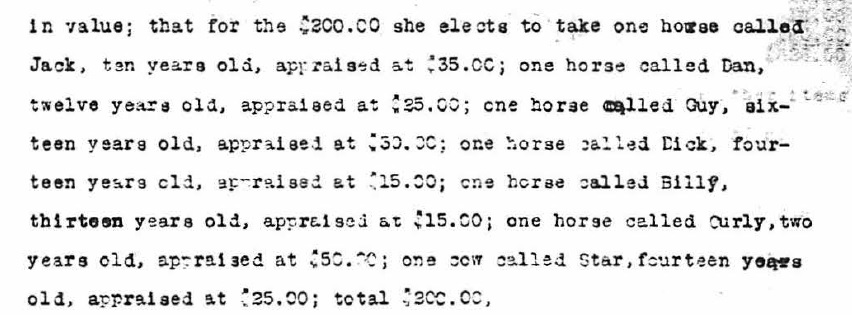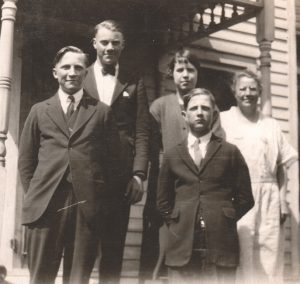Last time, we looked at all the debts and bills that Clara had accumulated since Will’s passing. She owed $6,400 to creditors and her net worth was only $2,200. The farm was already mortgaged. She managed to save the farm, though. How did she do it?
First, her attorney helped her shield assets from creditors. This was perfectly legal; I imagine these laws were written to protect people just like Clara. Remember, this is a time when there is very little in the way of social safety nets – no Social Security, no welfare, etc.
On May 24, 1921, her attorney filed a petition, “Property Selected by the Widow and Petition for Authority To Sell The Remainder”. In this document, the attorney described each law that provided for Clara to keep property from the creditors, and then listed the property she was electing to keep.
First, the law allowed Clara to keep all of Will’s clothing and household furniture, plus $200 worth of his personal property. So her attorney helped her choose which items. Here’s what they decided:

Her choices included six horses and one cow. They probably had to figure out which combination of animals would add up to exactly $200.
Another provision of the law related to agricultural businesses entitled her to keep additional specified livestock and farm equipment. For this exemption, she chose to keep two more horses (“Ned” and “Timm”), another cow “Spink”, and various farm implements.
For the remainder of the property, the attorney writes this:

Clara is offering to PURCHASE the remainder of the personal property in Will’s estate at its appraised value. Wait a second, where is she coming up with the money to do that?
The answer lies in the final documents in the probate file.

That’s right – her dear parents Anders and Gustafva Brodd have lent her money to settle the entire estate. The Final Report shows how Clara used this money to pay off every last creditor. There is a detailed listing show every bill and debt paid. There are a few interesting things in the list:
- One of the bills was paid to “E.C. Hanson, account for mdse” – this is Edward C. Hanson, my great-grandfather on Dad’s side of the family. He ran a General Store in Ceresco.
- Bills for Dr. Owin and to Emmanuel Hospital were for the “sickness of Elmer” in September, 1920. More bad luck for this family! Do any of you cousins recall why Elmer was in the hospital that year?
- “Alida Novak” was paid $45 for nursing the deceased. This would have been Will’s youngest sister.
- Several bills were paid to her own brothers for various farming expenses. I am sure the family united to help Clara with the understanding that the parents were the underlying safety net.
The file was closed with P.W.’s estate owing Clara $7,279.83.
So at the end of all these maneuvers, Clara is left with her farm operation intact and a home to live in. She owes $8,000 on the farm mortgage and owes $7,000 to her parents.
If you are interested in reading the details of the probate file, you can download the whole thing here.
Final Thoughts
What a sad story this is, on every possible level. Will and Clara were building a farm operation during the agricultural boom time of World War I. But his illness and death couldn’t have come at a worse time – right as the farm economy crashed.
Something that I wonder about is why Will and Clara had a mortgage in the first place. Wasn’t Will supposed to have inherited a farm from his father, Christian – the original 80-acre homestead up by Weston? Somehow that property was sold and Will and Clara had to purchase the Ceresco farm with debt. This all goes back to Will’s uneasy relationship with his father and the deal he struck with him to give up his job with the Union Pacific in Laramie and return home to farm. Remember the weird lease agreement from 1905? A future trip to the Saunders County court house might shed some light on this.

While this is the last installment on P.W. Pearson’s probate papers, the story for Clara is far from over. I’ll be moving on now to the documents I have in my files that show how she slowly climbed out of her mountain of debt. There are a few more surprises in store! Any Brodd cousins reading this will want to stay tuned for sure.
Something I kept thinking of as I read through and researched Will’s probate file was the movie “Places in the Heart” starring Sally Field. If you haven’t seen this movie before, I highly recommend it. Although it is set in Texas in the 1930’s, the story about a widow struggling to keep her farm contains many parallels to Clara’s situation. The movie ends on an optimistic note, but Sally Field’s character is left hanging with the same dilemma that Clara faced: she saved the farm from immediate danger, but how will she keep it solvent for the long haul?
Stay tuned.

Thanks for all your research. I like the details of life that are explained. Grandma raised four good children in hard circumstances. And the farm is still in the family!